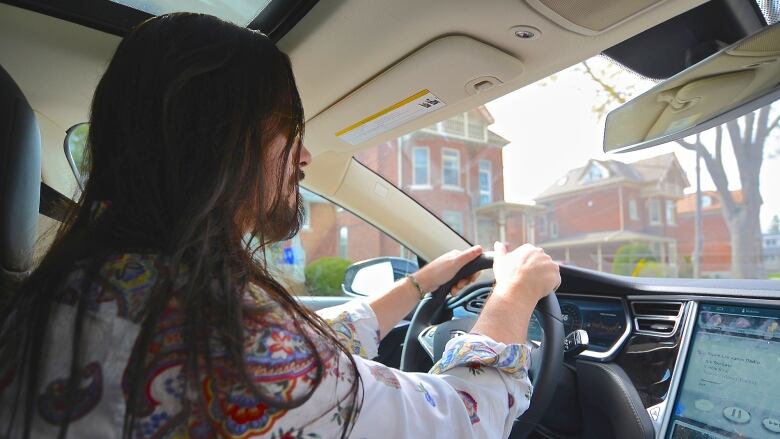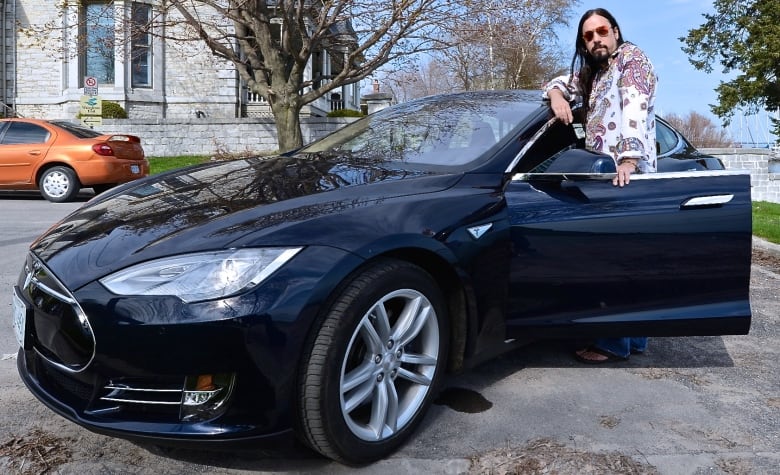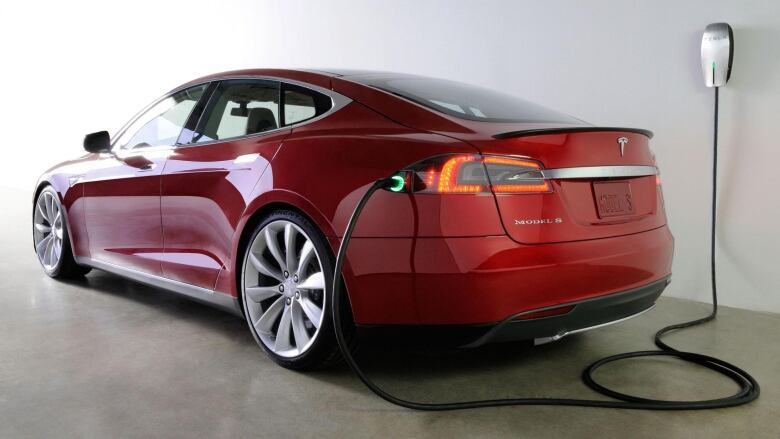Electric car drivers hope more charging stations will reduce 'range anxiety'
Most EV batteries last about 60 km before needing a charge

You've heard of road rage, but what about "range anxiety"?
Dont know what that is? Anyone who owns an electric car can tell you.
It's the panic electric vehicle (EV) drivers feel when they're on the road and unsure of where the next charging station will be.
Its a major concern, especially as we head into the summer driving season. But with thousands of Canadians investing in theseeco-friendlyautomobiles, more and more companies are installing charging stations to ensure a stress-free ride forEVdrivers.
As of the end of April, there were around 6,600 plug-in cars driving on the roads in Canada. That doesnt include hybrid cars, according to statistics collected by MatthewKlippensteinof the web siteGreenCarReports.
Until recently, many electric cars hadbatteries that only lasted about 60 kilometres before needing a recharge. Electric car expert MarcelodaLuz estimates the average daily commute is around 50 kilometres, which madeit pretty challenging for earlyelectric car owners to get to a charger before the battery drained.
But that's changing. The newTesla Model S, for example,has a range of up to 480 km. The Nissan Leaf has a range of 135 km.
Meanwhile,more charging stations aresprouting up along common routes.
Since I started driving my Nissan Leaf in March 2013, the quantity of charging stations has doubled, says Bruce Stout, president of the Vancouver Electric Vehicle Association (VEVA).
Placing these charge stations at a 50- to 80-kilometre distance from each other will allow greater use of these vehicles for inter-urban travel.

Car brands such as Nissan and Tesla know that the easier it is to charge up, the more enticing it will be for drivers to swap their gasoline-fuelled cars for battery-powered ones.
Best Western hotels now offer high- voltage charging stations free of charge, while a number of Longo's grocery locations also have them.
Andy Thomson, a Tesla driver who lives on the Quebec side of the Ottawa River, says that at the beginning of the winter, there weren't many charging stations around, but "now theyre everywhere," he says.
"Its going to make my winter travel a lot easier."
The Nissan Leaf has a GPS application that uses Google Maps to display the nearest charging stations to the driver.
According to a communication manager at Tesla, the company will install a number of its brand-specific superchargers which allow people to power up in half an hour in June along highways in Ontario and British Columbia. More superchargers are scheduled to pop up in Quebec and Alberta later this summer.
Batteries drain faster in the cold
One of the quirks of electric car batteries is that they are less efficient in the winter, because its harder for them to retain power in cooler temperatures. Not only that, drivers naturally want to heat the interior of the car, which only increases the load on the battery.
For Kingston, Ont.-based Rob Baker, guitarist for the Tragically Hip and the owner of a Tesla Model S, the superchargers could mean less white-knuckle driving on family weekend trips next winter.
On the coldest day of the year, when it hit minus-28 thats without wind chill we had to drive to Toronto and we made it, but just barely, says Baker of thememorable 240-kilometre trip.

Thats because we had the seat heat cranked up max, the heater on in the car with the fan blowing, the radio blasting and were starting with a car that was in minus-28 weather, so the battery's cold.
Some drivers will go to extreme lengths to preserve battery life during long treks. Thomson says he will drive behind trucks so there's "less aerodynamic drag" on his Tesla and wear more layers so he doesn't have to crank the heat in the car.
Its not uncommon for me on a long road trip in the winter to be wearing a down jacket, mittens and a toque because I dont have the cabin heated to Palm Springs temperatures, he says.
Car manufacturers are working to update technology to prevent car batteries from losing power so quickly in colder weather.
Stout says while the 2012 Nissan Leaf wastes around 20 kilometres of range per 100 kilometres, newer models use an improved hybrid heater design that loses only nine kilometres.
Despite the current challenges of driving a battery-powered car, Baker says he prefers his new Tesla to his last car, a Lexus hybrid.
I dont really get all excited about cars, he says, but he confesses that when it comes to his Tesla, he's still in the "honeymoon stage."
"Its all very exciting, he says.












_(720p).jpg)


 OFFICIAL HD MUSIC VIDEO.jpg)
.jpg)



























































































